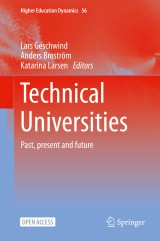Details

Technical Universities
Past, present and futureHigher Education Dynamics, Band 56
|
CHF 66.50 |
|
| Verlag: | Springer |
| Format: | |
| Veröffentl.: | 28.08.2020 |
| ISBN/EAN: | 9783030505554 |
| Sprache: | englisch |
Dieses eBook enthält ein Wasserzeichen.
Beschreibungen
<p>This Open Access book analyses the past, present and future of the technical university as a single faculty independent institution. The point of departure is a view of changing academic realities, through which the identity as a technical university is challenged and reconstituted. More specifically, the book connects the development of technical universities to changes in the structure and dimensioning of national higher education systems, to changes in the disciplinary basis of academic research and to changes in the governance of higher education institutions.</p>
<p>Introduced in the age of industrialization, polytechnical schools rose to prominence in many national settings during the second half of the 19th century. Over time, new technologies have been developed and incorporated into the repertoire, and waves of academisation have swept over the former polytechnics, transforming them into technical universities. Their traditions and brands, however, prevail. Several technical universities are included among the most prestigious academic institutions of their nations and the training of engineers and engineering research still enjoys a high level of prestige and national priority, e.g. in the context of innovation and industrial policy. But the world keeps changing, and the higher education sector with it. Will technical universities have an equally attractive position within university systems in the decades to come? </p><p><br></p><p> </p>
<p> </p>
<p> </p>
<p> </p>
<p>Introduced in the age of industrialization, polytechnical schools rose to prominence in many national settings during the second half of the 19th century. Over time, new technologies have been developed and incorporated into the repertoire, and waves of academisation have swept over the former polytechnics, transforming them into technical universities. Their traditions and brands, however, prevail. Several technical universities are included among the most prestigious academic institutions of their nations and the training of engineers and engineering research still enjoys a high level of prestige and national priority, e.g. in the context of innovation and industrial policy. But the world keeps changing, and the higher education sector with it. Will technical universities have an equally attractive position within university systems in the decades to come? </p><p><br></p><p> </p>
<p> </p>
<p> </p>
<p> </p>
<p>1. Organisational identities, boundaries, and change processes of technical universities; <i>Katarina Larsen, Lars Geschwind & Anders Broström</i>.- 2. Technical Universities: A Historical Perspective; <i>Lars Geschwind & Anders Broström</i>.- 3. Are some technical universities better than others?; <i>Mats Benner</i>.- 4. The position of technical universities within changing frameworks of institutional organisation and steering: the case of the Norwegian University of Science and Technology; <i>Agnete Vabø & Liv Langfeldt</i>.- 5. Understanding the development of technical universities in Poland; <i>Dominik Antonowicz</i>.- 6. Formalised boundaries between polytechnics and technical universities: experiences from Portugal and Finland; <i>Teresa Carvalho and Sara Diogo</i>.- 7. Technical Universities in Germany: On Justification of the Higher Education and Research Markets; <i>Christian Schneijderberg</i>.- 8. Integrating the academic and professional values in engineering education– ideals and tensions; <i>Kristina Edström</i>.- 9. Technical identity in a merger process – between a rock and a hard place; <i>Tea Vellamo, Elias Pekkola, Taru Siekkinen & Yuzhuo Cai</i>.- 10. Engineering academisation: the transition of lower level engineering education from upper secondary school level to higher education; <i>Per Fagrell and Lars Geschwind</i>.- 11. Double degree programmes in engineering and education—two cases from Swedish technical universities; <i>Mikael Cronhjort & Lars Geschwind</i>.- 12. Concluding discussion: The past, present, and future of technical universities; <i>Anders Broström, Lars Geschwind, Katarina Larsen.</i></p>
<p> </p>
<p> </p>
<p>This Open Access book analyses the past, present and future of the technical university as a single faculty independent institution. The point of departure is a view of changing academic realities, through which the identity as a technical university is challenged and reconstituted. More specifically, the book connects the development of technical universities to changes in the structure and dimensioning of national higher education systems, to changes in the disciplinary basis of academic research and to changes in the governance of higher education institutions.</p><p>Introduced in the age of industrialization, polytechnical schools rose to prominence in many national settings during the second half of the 19th century. Over time, new technologies have been developed and incorporated into the repertoire, and waves of academisation have swept over the former polytechnics, transforming them into technical universities. Their traditions and brands, however, prevail. Several technicaluniversities are included among the most prestigious academic institutions of their nations and the training of engineers and engineering research still enjoys a high level of prestige and national priority, e.g. in the context of innovation and industrial policy. But the world keeps changing, and the higher education sector with it. Will technical universities have an equally attractive position within university systems in the decades to come?</p><p> </p><p> </p><p> </p><p> </p>
Discusses what it means to be a technical university in the 21st century Draws on empirical, conceptual and theoretical studies of technical universities in Europe Offers a uniquely focused discussion of existential concerns for the technical university of the 21st century
Diese Produkte könnten Sie auch interessieren:

University Science and Mathematics Education in Transition

von: Ole Skovsmose, Paola Valero, Ole Ravn Christensen

CHF 118.00















